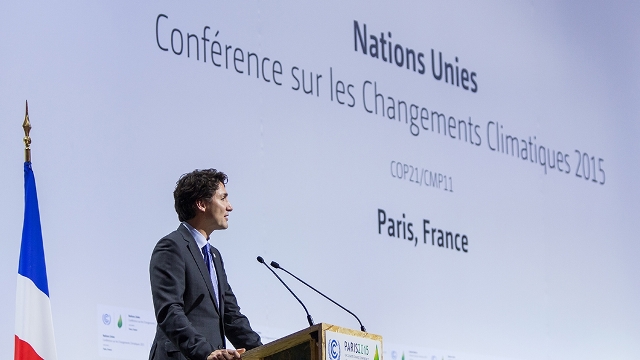
Opposition skewers Liberals on carbon tax, inaction as parliament returns
by Bruce Cheadle, The Canadian Press

Two days after the Liberal government committed to impose a vague federal carbon tax, Conservatives critiqued it as a "cash grab," while NDP said it was the same, inadequate Tory plan, "except with a smile"

Trudeau speaking at the COP21 Conference in Paris, where he delivered a message about redefining Canada’s economy—a position that’s now being challenged by the NDP in parliament. PHOTO: Government of Canada
OTTAWA—“Because it’s 2015” became a Liberal catchphrase after the election of the new government late last year, but the return of Parliament Sept. 20 following a three-month summer recess had a distinctly 2008 feel.
Consider the similarities: A federal government earnestly promising to address climate change while insisting it will protect the economy; repeated warnings about a “job-killing carbon tax”; a third party lamenting interchangeable Liberal and Conservative policy dithering.
Only the players have changed.
The fall sitting of the House of Commons promises some high theatre for energy and environmental policy wonks as the Liberals have engineered a schedule that calls for a number of crucial decisions by Christmas. But on Monday the place had the spontaneity and verve of a tired re-run.
The heckling began even before the curtain rose.
Last week, government sources told The Canadian Press that Canada would ratify the landmark Paris climate accord this fall before it finishes negotiating a plan with the provinces and territories to achieve the country’s international commitments. Then Environment Minister Catherine McKenna used the televised Sunday politics shows to promise the unilateral federal imposition of a carbon price on any province that doesn’t come up with its own carbon tax or cap-and-trade system.
That was enough to prompt broadsides from left and right, with Saskatchewan Premier Brad Wall openly musing about why Canada should make any sacrifice on climate change given that the country produces only about 1.6 per cent of global greenhouse gas emissions.
The Liberals staged a photo op Monday on the Hill, with McKenna, Natural Resources Minister Jim Carr and Transport Minister Marc Garneau arriving by fuel-cell powered vehicle, but their greenly optimistic visuals were shrouded by a fog of opposition rhetoric.
Interim Conservative leader Rona Ambrose called the federal carbon price “just a cash grab.”
“I don’t think Canadians want to be taxed more heavily, particularly when they don’t see any plan to help the environment,” Ambrose told a news conference.
McKenna maintained she’s keeping provinces and territories in the loop after a summer of consultations, and that the mechanics of carbon pricing are being negotiated.
Her response was not well received.
In all, five different Conservatives pounded away at the carbon tax theme during Monday’s question period. Alberta provincial leadership candidate and soon-to-be-former MP Jason Kenney reprised the 2008 Conservative election “tax on everything” charge almost verbatim, while MP David Anderson accused the Liberals of “declaring all out war on the provinces” and of “viciously targeting rural people and agriculture.”
McKenna eventually acknowledged that there is concern about carbon pricing in Canada’s northern territories, where fuel costs are already sky high.
Government sources have said the only acceptable carbon pricing mechanisms are either a direct carbon tax, such as the one in B.C., or cap-and-trade systems like Quebec and Ontario.
Prime Minister Justin Trudeau indicated Monday that other forms of regulation might also qualify as carbon pricing.
“We all got together, all the different premiers of the provinces and the federal government, and we all agreed that pricing carbon pollution has to be the way forward. It’s just smart economics to put a price on the things that you don’t want,” Trudeau said in livestreamed interview with U.S.-based BuzzFeed News.
“Now what form that takes—whether it’s a carbon tax, whether it’s a cap-and-trade, whether it’s through regulations—there’s all sorts of interesting and important discussion to be had; we have very different jurisdictions across the country.”
New Democrats were content to shoot the wounded.
They focused on the inadequacy of Canada’s emission targets, noting the Liberals have adopted the Conservative goal of cutting greenhouse gases 30 per cent below 2005 levels by 2030—a measure that won’t put Canada on track for the deep emissions cuts that McKenna lobbied for so heavily last December in Paris.
NDP interim leader Tom Mulcair accused the Liberals of serving up the same Conservative plan, “except with a smile.”